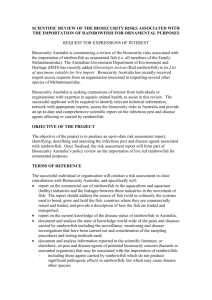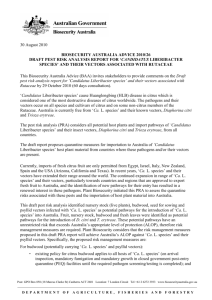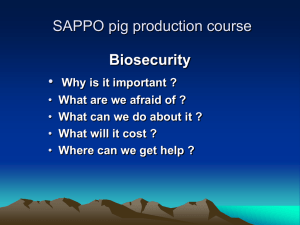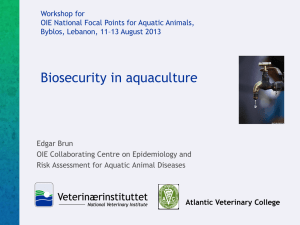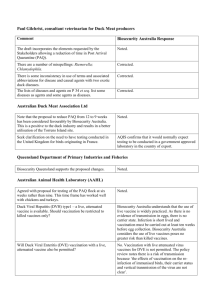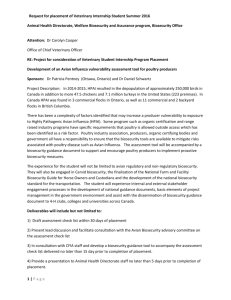Social and political discourses
advertisement
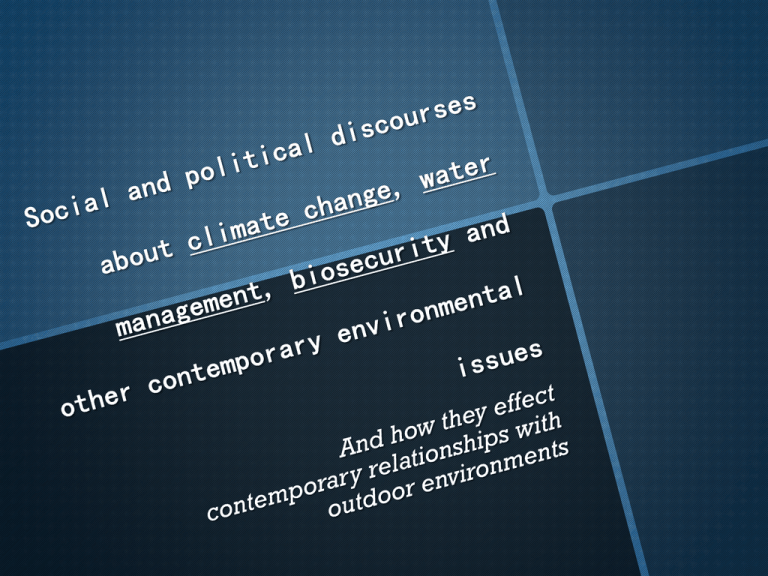
Climate change is a significant and lasting change in the statistical distribution of weather patterns over periods ranging from decades to millions of years. It may be a change in average weather conditions, or in the distribution of weather around the average conditions. Political Discourse Climate change is a long-term, global problem. Long-term problems generally require stable but flexible policy implementation over time. However, Australia’s commitment to climate action over the past three decades could be seen as inconsistent and lacking in direction. At times Australia has been an early adopter, establishing the world’s first government agency dedicated to reducing greenhouse gas emissions; signing on to global climate treaties the same day they are created; establishing the world’s first emissions trading scheme (ETS) (albeit at a state level); and pioneering an innovative land-based carbon offset scheme. Disbanding the climate change government agency; Creating a new one then disbanding that; Refusing to ratify global treaties until the dying minute and introducing legislation to repeal the national Emissions Trading Scheme. The inconsistent nature of Australian climate policy cannot be fully explained by looking at which political party was in government at the time. Both Labor and Liberal Governments have advanced (and sometimes regressed) on climate change. For example, in 1990 Labor was in government. It resisted adopting an emissions reduction target canvassed by its own Minister for Environment, only doing so with a ‘no regrets’ proviso, which rendered the target ineffectual. Yet a Labor Government is also responsible for Australia’s current 2020 emissions reduction targets. A Labor Government represented Australia at the Rio ‘Earth Summit’ in 1992, brokering and immediately signing Australia onto the United Nations Framework Convention on Climate Change (UNFCCC). A Liberal Government then continued the momentum, negotiating on Australia’s behalf, in deliberations over the Kyoto Protocol to the UNFCCC and signing the treaty shortly after. However, the same Liberal Government later refused to ratify the Protocol, claiming that doing so was counter to the nation’s interest. The newly installed Labor Government ratified the Protocol. Nevertheless, the succeeding Labor Government, which helped negotiate in 2011 an agreement to continue the Kyoto Protocol beyond 2012, would not initially join a second deal. It was not until a year later it did so, and Australia agreed to join a second commitment period of the Kyoto Protocol. A current issue of political contention (as of November 2013) is Australia’s ETS, which the Coalition Government has pledged to repeal. Putting it simply it is the way Australians and Australian Government decide to manage our water supply Much government action during drought Conflict in public and industry opinion Biosecurity is a set of preventative measures designed to reduce the risk of transmission of infectious diseases, quarantined pests, invasive alien species and living modified organisms. http://www.youtube.com/watch?v=20WAT1vt6gE&list=PL W8BDgtH4tUEpj0OBdpO2eNFCI8hMip2E&index=2 Their core priorities in managing biosecurity are to: Manage Australia's biosecurity by effectively identifying and targeting our management of risks to focus on the things that matter most Partner with other governments, industry, clients and stakeholders Deliver biosecurity services to support access to overseas markets and protect the economy and the environment from the impacts of unwanted pests and diseases Support Australia's reputation as a competitive exporter of agricultural goods and products. To better address future biosecurity demands, the department has brought together its biosecurity research, policy and program areas for animal, plant, food and quarantine operations. At the border Department of Agriculture staff deliver inspection and certifications services, and facilitate the movement of people and goods. Beef imports Californian table grapes Importation of dogs and cats and their semen from approved countries Drosophila suzukii (spotted wing drosophila) Fresh island cabbage from Cook Islands, Fiji, Tonga and Vanuatu Risk analysis for the release of Eueupithecia Cisplatensis for the biological control of Parkinsonia (Parkinsonia aculeata) Ginger from Fiji Grapevine (Vitis species) propagative material into Australia Horses from approved countries Hatching eggs of domestic hens and turkeys – avian paramyxovirus 2 and 3 Laboratory mouse embryos from approved countries - hantavirus Lychees from Taiwan and Vietnam Risk analysis for the release of the parasitoid wasp Mastrus ridens for the biological control of codling moth (Cydia pomonella) Risk analysis report to consider a proposal for the release of the tortricid moth Cydia succedana for the biological control of gorse (Ulex europaeus) Potato propagative material into Australa Commercial rabbits from certain Member States of the European Union Review of gamma irradiation as a treatment to address pathogens of animal biosecurity concern Review of published tests to detect pathogens in veterinary vaccines intended for importation into Australia - Second Edition Salacca (snakefruit) from Indonesia Table grapes from Japan Within Australia a Biosecurity flying squad swoops DANNIKA BONSER 15 May, 2014 AUSTRALIA is set to get a 'biosecurity flying squad' as part of the Coalition's $20 million Federal Budget allocation toward improving the country's preparedness for an outbreak like Foot and Mouth Disease (FMD). "The flying squadron will include biosecurity experts who will react quickly to respond to major incidents such as FMD, which could decimate Australia's agriculture industry overnight," the spokesman said. "The other details [the policy includes] is developing and expanding vaccine stores, the introduction of rapid response teams and furthermost it's bringing together national and international experts to respond to incursions." According to the policy document, the squad would predominantly deal with domestic matters, but could be deployed offshore in the event of a biosecurity problem in the live export supply chain. "Any initiative by the government to allocate extra financial resources to biosecurity is a good initiative," VFF livestock spokesman Ian Feldtmann said. "What it indicates is the government recognises that biosecurity is important for the agriculture industry but it's important that government and industry work together." Steve Irwin: http://www.youtube.com/watch?v=9Z aC1kcZZlE Bordersecurity: http://www.youtube.com/watch?v=C 5upJhSp2z8 Select one of the issues: - Climate change - Water management - Biosecurity And complete the following… Create a Presentation and Report detailing: - Australian political opinions, standpoints and action on the issue (including the supporting arguments for both sides) Public’s opinions, standpoints and action The effect all of this is having on our relationships with outdoor environments in Australia This needs to be a comprehensive presentation and a 300 word report. Due to be presented Monday 27th


